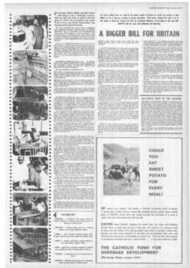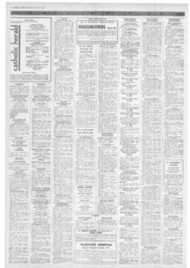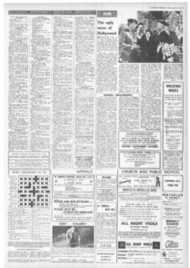Page 3, 24th June 1966
Page 3

Report an error
Noticed an error on this page?If you've noticed an error in this article please click here to report it.
Tags
Share
Related articles
Clothing The Word With Flesh
Fr. Agnellus
I Catholic Profiles: 62
" Anvil" Questions Include Christian Co-operation And...
Taking Advantage Of The Media Legacy Of Bishop Agnellus
`Goldie' is quite o"'
0/" a catch for /0" the Catholic Radio-tv Centre
"SHE'S an amazing personality. I mean, you wouldn't be surprised to see her perched in a tree." This is how Catholic radio priest, Fr Agnellus Andrew enthuses about his latest find. The "bird-like" figure is one of Europe's most famous television producers, Mrs. Grace Wyndham Goldie. Known to the BBC backroom boys as "Goldie", she joins Fr. Andrew in what he calls "the front line of preaching the Gospel" next month. She goes to the Catholic Radio and Television Centre at Hatch End, on the outskirts of London, from the illustrious "Panorama" team that made the reputations of top-TV people. Mrs. Goldie, who is retiring from the BBC (she's in her late 50s) is a practising Anglican, educated at a Convent school in Egypt. "She's desperately keen to work for us," says Fr. Andrew, and has all the experience in the world to stop us from making mistakes in our formative period."
Among Britain's TV men she is regarded as one of the first three or four domumentary producers in Europe. Besides her work for the vis
BBC she is a television critic for the Sunday Telegraph and is currently working on a Nuffield Foundation Research Scholarship at Oxford. She's the catch of the year, and Fr. Andrew, the live-wire Franciscan who 11 years ago founded the Radio and TV Centre on nothing (". . .that's right, on nothing . . . all we had was a house given to us by Cardinal Griffin") knows it.
Hebelieves his team of communications experts at Hatch End can , now match the technical quality of their £100,000 sound and television studio, due for opening in October, next year.
Fr. Andrew, whose enthusiasm and sharp intellect are soberly disguised in a simple brown habit is a man who really understands the word "modern" when the Vatican Council says it wants a "Church in the Modern World".
"Look at it this way," he says. "How many people in Britain went to church last Sunday. The opinion polls tell us five million. How many watched or heard a religious programme . . . 25 million. Let's face it. The people haven't rejected God. They just don't want organised religion, and it's our job to take God into their homes."
Unknown jargon
But getting into the family living room, admits, Fr. Andrew, represents a problem. How can you tellpeople about God when no -longer do they accord the Church any authority „or share your assumptions about God? How can you get through to people who no longer understand the "jargon"? H pointedly asks: "Tell me, who among the non-churchgoers (and this could apply to some churchgoers as well) understand words like grace, sanctification, Sacred Heart. and Immaculate Conception? They have no meaning to them . . . no meaning whatsoever. How then are you going to communicate your conception, your knowledge of God to these people, without sacrificing your convictions or watering down your Faith?" This, says Fr. Andrew, is the crunch. Christians have to learn to gain access to the hearts and minds of the mass of good living, decent every-day people who have no religious affiliation. And so, to Fr. Andrew's job at Hatch End; training professional priests, professional housewives, professional journalists to communicate . . to find their audience . . to become professional (at least in their thinking) broadcasters.
Prominent Catholic women who are likely to be asked to comment on topical subjects like The Pill, abortion, morality and unmarried mothers, are the kind of lay-people Fr. Andrew takes to Hatch End for training. Priests who are asked by the BBC and ITV to give talks arc trained to the realisation that they are talking to an audience, which largely, "just deosn't want to know".
"But don't get the idea the Radio and TV Centre's just for Britain's benefit," he told me. the latest on Bobby Kennedy . . the latest on the seamen's strike."
"Can you imagine just how they
A
must be?" asks Fr. Andrew. And most of their transistorised information comes via Peking and Moscow. "Radio Peking has one of the most powerful transmitters operating," says Fr. Andrew. "It gives around-the-clock broadcasts of news, music, features and political comment and is relevant to the lives of the people to whom it directs its messages."
14-language station
But the Church is beginning to fight back. He told me radio and television stations are being set up around the world to speak to these people, although it is realised the Marxist message of better conditions, better government and a better material life, have more instant appeal than the message of Christianity. In July next year, a station in Manila will be beaming out the Christian message in 14 languages to Asia. Although controlled by the Church in the Philippines, it has been financed largely by Catholics in Germany, Holland and America. The French Dominicans have a much smaller station for broadcasting to Central Africa from Gitarama, Ruanda, Dutch Catholics are broadcasting full-time to the peoples of West Africa from a station in Liberia.
This, says Fr. Andrew, is where Britain's Catholic Radio and Television Centre, comes directly into the picture. English is now a language of No. 1 importance. It's the lingua franca and is being used more and more by Christians in Africa, Asia and South America. Now he and his team have to train them to use it more effectively.
Mrs. Goldie will be taking her first batch of overseas students for a two-week crash TV course, starting on July 25.
Fr. Andrew wants the "transistor" audience of Africa to eventually find a programme from a Christian station just as interesting, entertaining and attention-holding as that from a Marxist. He doesn't want to see a station broadcasting a few hours a week on some pious talk or giving a dull list of episcopal appointments. Ile knows the Christian message is vital and contemporary and it only needs money to put it across.
Yes, money. His nimble mind keeps darting back to this recurring problem. "It's frustrat
ing, you know," he confides to his friends in gather the radio and TV world who ther at St. Gabriel's. "I could run this place for the cost of just one Catholic school. But there you are. I haven't got a parish." The day he spoke to me he had just returned from Ipswich and that same night was due to talk to the Knights of St. Columba at Croydon. He regrets that a decade has passed and still he has no studios, but this has not daunted his enthusiasm. "We've been promised £240,000 in the next seven years. Mind you, we will need twice that amount, but I'm sure Catholics will realise the importance of our work." Studying the model of his projected expanded Radio and TV Centre, which sits on the piano in his lounge, he muses, ". . . well, there's £30,000 for the hostel to house visiting students. That's due for completion soon. There's say, £100,000 for the studio building. Say another f30,000 for the equipment. Then, of course, we've got to pay a professional staff to run it. Say, another £20,000 a year .. ."
blog comments powered by Disqus











